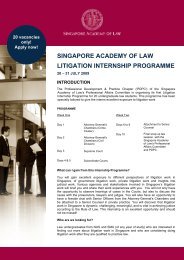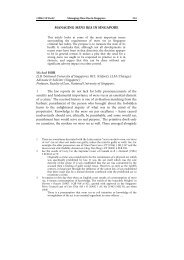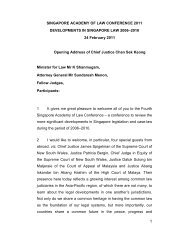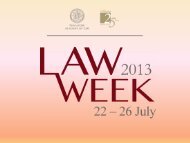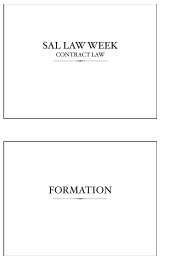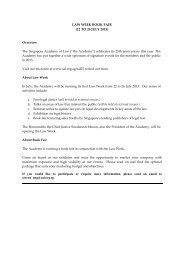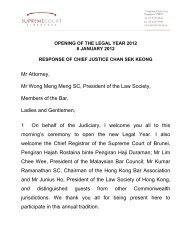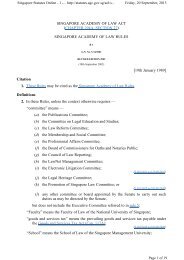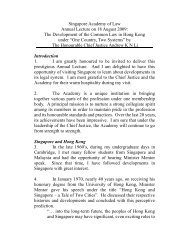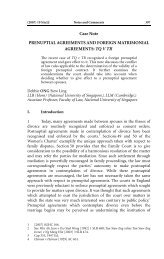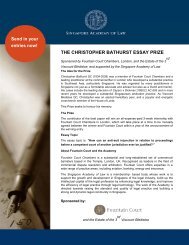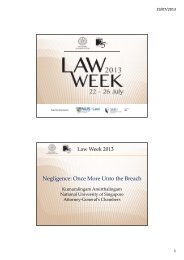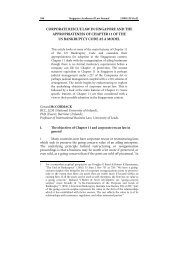View Article - Singapore Academy of Law
View Article - Singapore Academy of Law
View Article - Singapore Academy of Law
Create successful ePaper yourself
Turn your PDF publications into a flip-book with our unique Google optimized e-Paper software.
15 SAcLJ Matrimonial Assets and the 3 rd Party 241<br />
“Another bone <strong>of</strong> contention between the parties was as to<br />
whether the husband’s mother should be repaid her loan with<br />
interest and if so, at what rate. The first issue was easily disposed<br />
<strong>of</strong> by asking, what would have been the alternative if the mother<br />
had not extended the loan The answer must surely be that the<br />
parties or one <strong>of</strong> them would have had to borrow the required<br />
sum from a financial institution. Why then should there be any<br />
difference when the mother lent the parties the monies drawn<br />
from her overdraft account with DBS Bank… I could see no<br />
distinction between a direct borrowing by the parties from a<br />
bank and indirect borrowing by them through the husband’s<br />
mother; in both instances interest is payable and I held that the<br />
repayment to the husband’s mother should include<br />
reimbursement <strong>of</strong> interest at a lower rate (6%) than what she had<br />
to pay DBS Bank (7%) on her overdraft facility.” (per Lai Siu<br />
Chiu J)<br />
51 It should be noted, in this regard, that the 3 rd party lender who is<br />
not a secured creditor would <strong>of</strong>ten be a close family member or friend <strong>of</strong><br />
the husband and wife. The money would have been lent on the strength<br />
<strong>of</strong> the personal relationship the lender had with either or both the<br />
husband and wife. In this regard, the husband and wife would have<br />
benefited from a loan <strong>of</strong> money, which they may not have been able to<br />
obtain from a commercial source. Even if they had managed to obtain<br />
such a loan from a commercial source, there would <strong>of</strong>ten be no interest<br />
charged in respect <strong>of</strong> the “friendly” loan, and no need to provide any<br />
security. Since both the husband and wife would have benefited from the<br />
3 rd party’s generosity in this respect during the marriage, it seems only<br />
equitable that upon the breakdown <strong>of</strong> the marriage, the 3 rd party should<br />
be repaid the monies he had advanced with interest.<br />
(ii)<br />
Where debt cannot be attributed to any particular matrimonial<br />
asset<br />
52 Where the debt cannot be attributed to any particular<br />
matrimonial asset, the court should consider a whole range <strong>of</strong> factors in<br />
deciding whether to order the 3 rd party to be repaid from the pool <strong>of</strong><br />
matrimonial assets (“the repayment order”).<br />
53 Although the English case <strong>of</strong> Harman v Glencross 45 involves a<br />
discussion <strong>of</strong> legislation <strong>of</strong> which there is no equivalent in <strong>Singapore</strong>, it<br />
45<br />
[1986] 1 All ER 545



